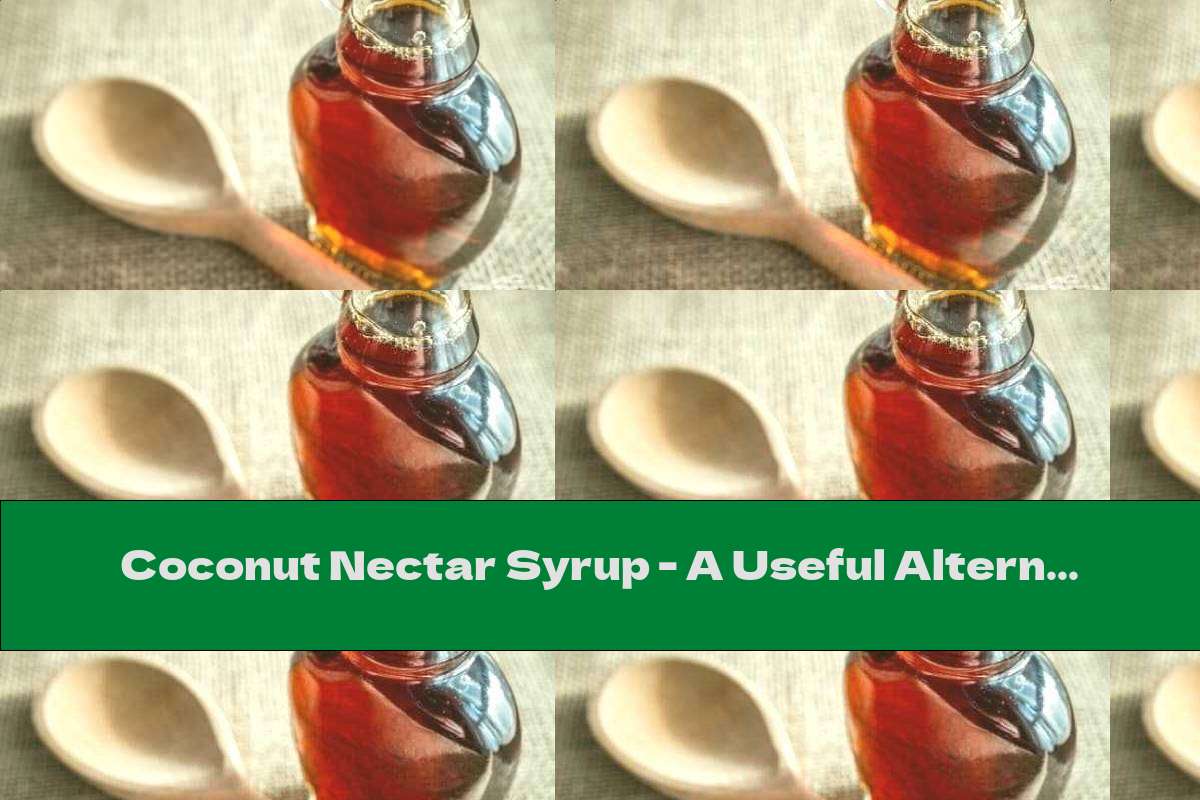Coconut Nectar Syrup - A Useful Alternative To Sugar
 Author: Maryam Ayres
Time for reading: ~2
minutes
Last Updated:
August 08, 2022
Author: Maryam Ayres
Time for reading: ~2
minutes
Last Updated:
August 08, 2022

CHAPTERS (Table Of Contents)
In this article, learn more about Coconut Nectar Syrup - A Useful Alternative To Sugar. Coconut nectar syrup - a useful alternative to sugar.
Consumption of too much sugar is not good for our health. This puts us at risk for diabetes and obesity. For this reason, people diagnosed with such disorders should avoid or limit the use of plain white sugar. But what is the alternative to white or brown sugar? Fortunately, there are sweeteners that can reduce the chances of raising blood sugar levels. One of these options is coconut nectar syrup.
What is coconut nectar syrup?
Coconut syrup is a delicious natural sweetener made from the nectar of coconut palm flowers. This nectar is found inside the flowers of the coconut palm. Farmers extract sweet nectar in a similar way to maple syrup production. The nectar is then collected in bamboo containers and placed under controlled evaporation until it reaches the consistency of syrup. This evaporation can be continued to obtain another coconut product that we know - crystallized coconut sugar, suitable for use in many recipes.
Raw coconut nectar does not taste like coconut. It is very sweet, resembling caramel, like molasses or palm fruit.
Why use coconut syrup?
Coconut nectar or syrup is a low glycemic natural sweetener. The glycemic index is the standard measurement used to determine how quickly blood sugar levels rise after drinking or eating a certain type of drink or food over a period of 2-3 hours. The lower the glycemic index (GI), the slower the release of blood sugar. Raw coconut nectar is one of these sweeteners with a low glycemic index (35). Not only does it contain small amounts of glucose, sucrose and fructose, but it is also high in fiber, which aids the digestive process.
Low glycemic index sweeteners are a healthier choice for most people, but they are especially helpful for diabetics and people who want to lose weight. This is because these foods are less likely to cause a rise in blood sugar and then a sharp drop in it after eating. These peaks are not healthy and can cause insatiable appetite and a frantic craving for sugar. Avoid foods with a high glycemic index, such as glucose (100), maltodextrin (150), corn syrup (75) and others.
Coconut nectar is naturally sweet. It does not require high temperature evaporation techniques or chemical treatment to make it sweeter. Therefore, the enzymes that are in the coconut palm and the entire nutrient content will be preserved.
High content of amino acids and nutrientsThe rich soils in which coconut palms grow are the main source of food for palm trees. Therefore, juice and nectar are usually high in amino acids, minerals, many vitamins and trace elements. Some of them are useful vitamins B1, B2, B3, B6 and vitamin C, as well as the minerals magnesium, potassium, zinc, iron and others.
There are a total of 17 amino acids found in raw coconut nectar. Amino acids are the building blocks of protein and are important for many bodily functions, including the transport and storage of nutrients. They make up our cells, tissues and muscles and are essential for muscle growth and tissue repair.
By including coconut nectar in our diet, we will enjoy not only its sweetness, but also all the benefits it brings. We can use it to sweeten coffee, tea or other beverages. It is a great addition to pancakes, pastries, raw desserts, smoothies, candies and more. Suitable for vegans and vegetarians. It perfectly replaces sugar, honey, maple syrup, agave syrup and other sweeteners.
- Is coconut sugar healthier than regular sugar?
Related Articles
- Fruitskewers in Honey Syrup: Nutritional Benefits and Recipes
- Nutritional Benefits of Fruit Skewers in Honey Syrup: A Delicious and Healthy Recipe
- Nutrition Guide: Fruitskewers in Honey Syrup - Benefits, Recipes, and More
- Nutritional Benefits of Fruit Skewers in Honey Syrup: A Healthy and Delicious Snack
- The Complete Guide to E339ii in Nutrition: Benefits, Regulation, and Alternatives
Top Nutrition Articles Today
- . The Role of Hydrochloric Acid in Digestion: A Comprehensive...
- . Chicory: 15 Health Benefits, How To Drink, Contraindications...
- . Hydrochloric Acid in Digestion: Importance, Symptoms, and Na...
- . The Role of Hydrochloric Acid in Digestion: Importance, Symp...
- . The Science of Raising Agents in Baking: Chemical and Functi...
- . The Complete Guide to Fructose in Nutrition: Metabolism, Hea...
- . How To Cook Beets So That They Do Not Lose Color
- . Ammonium Bicarbonate: Uses, Benefits, and Recipes for Baking
- . The Latest Food Pyramid: A Guide to Balanced Nutrition
- . How To Fillet Mackerel